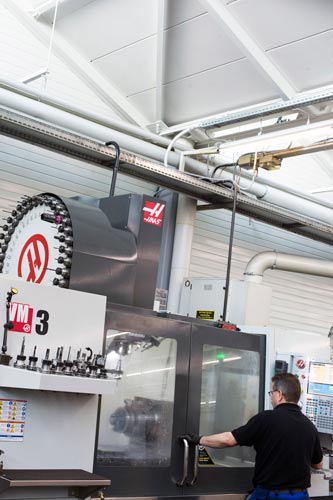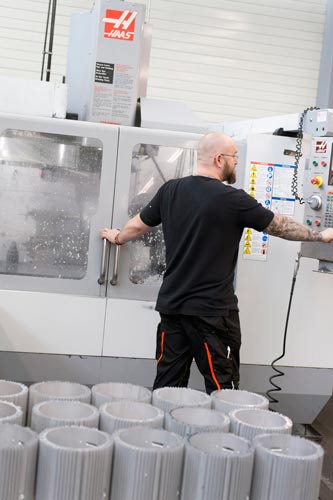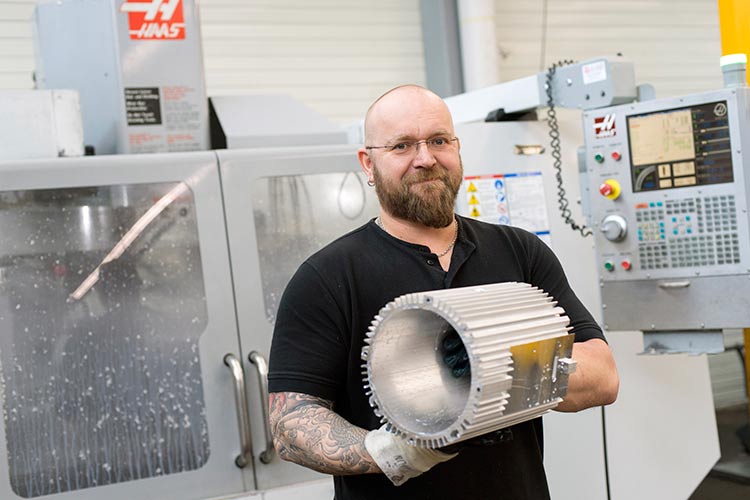Based in Dettingen, not far from Stuttgart, Germany, DIETZ-motoren is a privately owned business that has spent almost 100 years perfecting electric motors and radial fans used in niche industry sectors, such as food production, textiles, specialist machinery, etc.
None of the company’s products are made in great volume; some of the manufacturing processes, such as winding, are in fact still done by hand. However, DIETZ manages to produce around 150,000 motors and fans of various sizes and power outputs every year, most of which are shipped to customers overseas.

The company’s finishing and assembly buildings are busy, but light and relatively quiet, and are dotted with small tress and plants, which give a peaceful, natural feel. The adjacent machine shop, on the other hand, is noisy and, by comparison, frenetic. On most days, it’s open and running round the clock.
This is just one of the company’s two factory sites. The other is in the Swabian Jura, the low, snowy mountain range of the state of Baden-Württemberg.
The Dettingen site, with the bigger of the two machine shops, is home to six of the company’s eight Haas CNC machine tools. As well as Haas SL-30 and ST-30 turning centres and a Haas Mini Mill, there’s a Haas VF-5 and two Haas VM-3s, which do most of the higher-volume machining.
“The VM-3 was our first Haas machine,” says Chief Engineer, Dieter Irsiegler. “We needed a flexible vertical machining centre with good power and high spindle speed.
“We have a large and varied product range, so we also needed the optional 40-station tool changer. The table on the VM-3 – which has T-slots in X and Y, allows us very quickly and easily to create fixtures for our parts.”
Between them, the VF-5 and the VM-3 can be called upon to machine any part from a database of 400 different programmes, to tolerances of 0.02 mm. All the Haas machines work between 16 and 24 hours a day, depending upon demand, and each of them is equipped with a Haas HRT310 CNC rotary table.
“They’re very reliable machines,” adds Chief Engineer Irsiegler. “It doesn’t matter how many hours they work, they always keep tolerance. The VF-5 is actually ten years old, so it has made a lot of parts in its life so far.”
After the company had bought its two Haas vertical machining centres, it also invested in a Haas SL-30 turning centre, which, like the other Haas workhorses, runs 24-hour shifts. It’s used to machine high-tolerance surfaces on flanges.

“The Haas CNC is another feature of all the Haas machines that gives us greater flexibility. The control is very easy to use, and it’s essentially the same on all Haas machines, so we’re able to move operators between machines – whether vertical mill or lathe – when we need to.”
Again, according to Eng. Irsiegler, the Haas SL-30 has proven to be 100-percent reliable.
“Reliability and service are very important,” he reiterates. “We have no back-up, so if a machine were to break down, we’d need it fixed and up-and-running straight away. The local Haas Factory Outlet is very efficient, and they give us good and prompt support.”
For engineers like Dieter Irsiegler, who run CNC machines round the clock, and who want to sleep soundly at night, reliability and dependable support are essential. Unlike finishing and assembly areas, machine shops are very noisy places. They need to stay that way.


